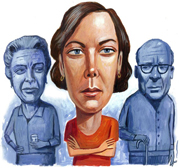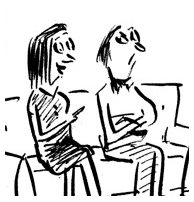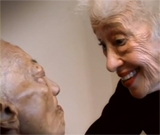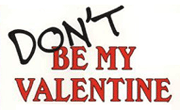 In an article in Psychology Today (12.4.2009) entitled What Makes Tigers Jump?, Professor of Psychology Harvey Milkman* looks at the much-discussed phenomenon of “love addiction,” clinically labelled “hysteroid dysphoria” by the New York State Psychiatric Insitute in 1979. Clinicians at the Institute labelled as a disorder a chronic and intense form of lovesickness they were observing with surprising frequency in the course of their psychiatric practice; the disorder was characterized by depression, depletion of energy, and increased appetite in response to feelings of rejection.
In an article in Psychology Today (12.4.2009) entitled What Makes Tigers Jump?, Professor of Psychology Harvey Milkman* looks at the much-discussed phenomenon of “love addiction,” clinically labelled “hysteroid dysphoria” by the New York State Psychiatric Insitute in 1979. Clinicians at the Institute labelled as a disorder a chronic and intense form of lovesickness they were observing with surprising frequency in the course of their psychiatric practice; the disorder was characterized by depression, depletion of energy, and increased appetite in response to feelings of rejection.
Must We Forgive Abusive Parents? (E. Yoffe)

The Slate, 2.18.13
The relationship of adult children to their abusive parents gets little attention in the psychiatric literature. In an article in The Slate (The Debt, 2.18.13), columnist Emily Yoffe asks what grown children owe terrible, abusive parents when the latter come crawling back, often elderly, feeble and needy; she offers her take on forgiveness. The following is a selection from her longer article.
Criticism: Kiss of Death

Can it be said enough times? Criticizing, nagging, fault-finding, accusing — these are behaviors that represent the largest predictors of divorce. While partners often nag, criticize and point fingers as a way to ask for help with housework or childcare or to urge a partner to be more responsible with money, it is an ineffective way to communicate needs and wishes. It instead leads to a “shutting down” that deepens resentment, estrangement and disconnection.
The Power of Validation & Connection (Feil)
 In this moving youtube video, Naomi Feil (MSW), founder of Validation Therapy, shares a breakthrough moment of communication with Gladys Wilson, a woman who was diagnosed with Alzheimer’s in 2000 and is virtually non-verbal.
In this moving youtube video, Naomi Feil (MSW), founder of Validation Therapy, shares a breakthrough moment of communication with Gladys Wilson, a woman who was diagnosed with Alzheimer’s in 2000 and is virtually non-verbal.
Although her interaction in this clip demonstrates her approach to working with severely disoriented elderly people, it speaks volumes to the potential power of validation and connection in so many other areas of our interpersonal and emotional lives.
The Ever-Changing Institution of Marriage (L. Mundy)
 In her thoughtful Atlantic cover story on gay marriage (The Guide to Wedded Bliss, 5.22.13), Liz Mundy suggests that the “great gay marriage experiment” teaches us how to reinvent marriage so that it’s durable through the next century. Mundy reminds us that, although marriage has changed a lot from the “Father Knows Best” days, it is still burdened with old notions and habits about how men and women should behave — habits that are largely at odds with economic and practical realities.
In her thoughtful Atlantic cover story on gay marriage (The Guide to Wedded Bliss, 5.22.13), Liz Mundy suggests that the “great gay marriage experiment” teaches us how to reinvent marriage so that it’s durable through the next century. Mundy reminds us that, although marriage has changed a lot from the “Father Knows Best” days, it is still burdened with old notions and habits about how men and women should behave — habits that are largely at odds with economic and practical realities.
Boosting Female Libido (D. Bergner)
 In a few short years, drugs aimed at boosting low libido among women may be approved for sale. In his recent New York Times article (Unexcited: There May be a Pill For That, 5.22.13), Daniel Bergner explores the decrease in sexual desire experienced by many women in long-term, committed relationships, and possible ramifications for medicinal boosting of flailing monogamous relationships.
In a few short years, drugs aimed at boosting low libido among women may be approved for sale. In his recent New York Times article (Unexcited: There May be a Pill For That, 5.22.13), Daniel Bergner explores the decrease in sexual desire experienced by many women in long-term, committed relationships, and possible ramifications for medicinal boosting of flailing monogamous relationships.
The following is a short selection from his article that I particularly liked.
The Value of Family Narrative (B. Feiler)
 Ben Feiler’s lovely New York Times piece (“The Stories That Bind Us”, 3.15.2013) is adapted from his recently published book, “The Secrets of Happy Families: How to Improve Your Morning, Rethink Family Dinner, Fight Smart, Go Out and Play, and Much More.”
Ben Feiler’s lovely New York Times piece (“The Stories That Bind Us”, 3.15.2013) is adapted from his recently published book, “The Secrets of Happy Families: How to Improve Your Morning, Rethink Family Dinner, Fight Smart, Go Out and Play, and Much More.”
Why Couplehood is So Difficult (Eva Illouz)
 With contemporary culture’s focus on individual satisfaction, the traditional couple relationship is much more difficult to achieve. With more and people opting to live on their own, is the very idea of couplehood passé?
With contemporary culture’s focus on individual satisfaction, the traditional couple relationship is much more difficult to achieve. With more and people opting to live on their own, is the very idea of couplehood passé?